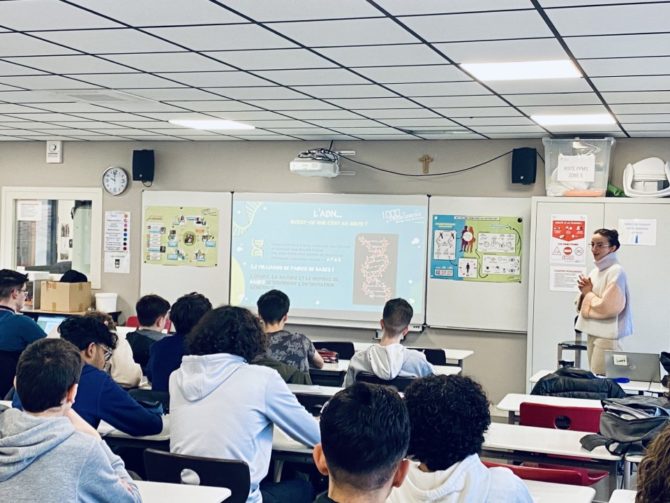 The 12th edition of the ‘1,000 researchers in schools’ operation has just come to an end. This year it ran from 4 November to 6 December.
The 12th edition of the ‘1,000 researchers in schools’ operation has just come to an end. This year it ran from 4 November to 6 December.
Nearly 1,500 events took place in 539 schools, introducing more than 60,000 pupils from 427 towns and cities to medical research. For the Institute, 36 experts took part in 219 events, interacting with 7,867 pupils in 77 establishments across France.
Feedback from four of the Institute’s experts who took part in the operation for the first time
Manon Beaujean, a young researcher in the Myasthenia Gravis: etiology, pathophysiology & therapeutic approach team led by Rozen Le Panse: ‘I gave a talk in the morning and one in the afternoon at a secondary school in Tours. The talks went very well… It was a positive and rewarding experience. The pupils asked me a lot of questions, mainly about careers and career paths, choice of studies and advice. There were also a few scientific questions. It was gratifying to be able to share my experience with them and perhaps inspire some of them. What’s more, being a woman presenter showed that scientists are not just men. This way I can inspire girls to study science.’
Olivier Deiber, IT manager at the Institute of Myology, concerned by the disease: ‘This was my first “solo” participation in Operation 1,000 Researchers… it was really very rewarding and I was faced with curious and interested children with pertinent questions…’.
Audrey El Kaim, physiotherapist in the Neuromuscular physiology and evaluation laboratory led by Jean-Yves Hogrel: ‘It was an enriching experience, allowing me to share the scientific advances supported by AFM-Téléthon with curious and attentive pupils, while at the same time sharing my experience as a physiotherapist in a laboratory. The presentations and materials provided, which were both entertaining and well thought-out, greatly facilitated the discussions and captured the students’ interest.’
Mattéo Ernu, a young researcher in the Biotherapies of motor neurone Disorders group (ALS & SMA) led by Piera Smeriglio: ‘This was my first experience with 1,000 researchers and I found it very formative and interesting, as I’ve always wanted to share my knowledge by popularising science. It was a real challenge to make sure that all the students paid attention and didn’t get bored of all the new information that was totally unknown to them. I really enjoyed it and I’ll be happy to do it again next year!’
